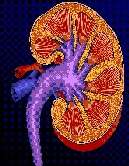The potent, selective vascular endothelial growth factor receptor-1, -2, and -3 inhibitor, tivozanib, demonstrates antitumor activity and is well tolerated in patients with advanced/metastatic renal cell carcinoma, according to research published online April 9 in the Journal of Clinical Oncology.
(HealthDay) -- The potent, selective vascular endothelial growth factor receptor-1, -2, and -3 inhibitor, tivozanib, demonstrates antitumor activity and is well tolerated in patients with advanced/metastatic renal cell carcinoma (RCC), according to research published online April 9 in the Journal of Clinical Oncology.
Dmitry A. Nosov, M.D., Ph.D., of the Blokhin Oncology Research Center in Moscow, and colleagues conducted a phase II randomized discontinuation trial (RDT) involving 272 patients with advanced or metastatic RCC to evaluate the antitumor activity and safety of tivozanib. Patients were given 1.5 mg/d orally for 16 weeks, where one cycle was defined as three treatment weeks followed by a one-week break. During the first open-label phase of the trial, patients who experienced 25 percent or more tumor shrinkage continued to take tivozanib, while those with less than 25 percent shrinkage progressed to the second 12-week, double-blind phase and were randomized to receive either tivozanib or placebo. If patients experienced 25 percent or more tumor growth, they were discontinued from the trial. Safety, objective response rate (ORR) at 16 weeks, and percentage of patients who were progression free after 12 weeks of double-blind treatment were primary end points, and progression-free survival was a secondary end point.
The researchers found that, overall, 83 percent of participants had tumors with clear-cell histology, 73 percent had undergone nephrectomy, and 54 percent were treatment naive. In the 16-week open-label phase, the ORR was 18 percent. Among the 118 patients randomized to treatment with tivozanib or placebo, a statistically significant between-group difference in the percentage of patients who remained progression free after 12 weeks was observed (49 and 21 percent, respectively). Grade 3 and 4 hypertension was the most common treatment-related adverse event.
"Results from this RDT demonstrated promising activity and an acceptable safety and tolerability profile for tivozanib in advanced/metastatic RCC," the authors write.
The study was supported by AVEO Pharmaceuticals; several authors disclosed financial relationships (including employment) with AVEO.
More information:
Abstract
Full Text (subscription or payment may be required)
Journal information: Journal of Clinical Oncology
Copyright © 2012 HealthDay. All rights reserved.




















